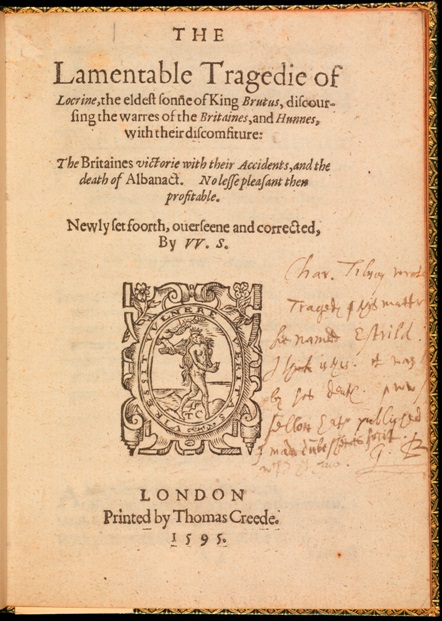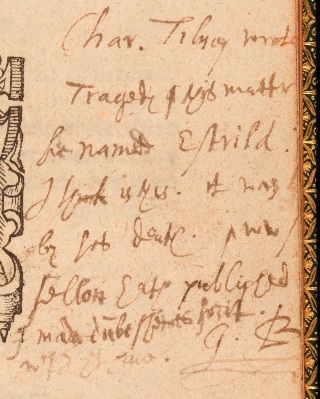Estrild
Charles Tilney (c. 1585)
Historical Records
Buc's note
An undated note in the hand of Sir George Buc on the title page of one of five surviving copies of Locrine (printed 1595) reads:
Char. Tilney wrote <a>
Tragedy of this mattr <wch>
hee named Estrild: <& wch>
J think is this. It was l<lost ?>
by his death. & now [?] s<ome ? >
fellow hath published <it.>
J made the dūbe shewes for it.
wch J yet have. G. B<.>.

|

|
Buc signature on the title page of Locrine; reproduced with permission from the Fondation Martin Bodmer, Cologny, Geneve.
Theatrical Provenance
Unknown; information welcome.
Probable Genre(s)
Tragedy
Possible Narrative and Dramatic Sources or Analogues
The story would have to be a pseudo-biography of Estrildis, daughter of the King of Germany, in the time of the war between Brute, first king of the Britons, versus Humber, King of the Huns, c. 1115-1075. B.C.E. According to Geoffrey of Monmouth, Estrildis was one of three captives aboard the ship of Humber, which held the spoil of Humber's recent conquests in Germany. Locrine, eldest son of Brute, defeated Humber in battle (Humber fled and drowned in the River Humber). Locrine then pillaged Humber's ships and claimed the girls. It was Estrildis who set him on fire, however: "so fair was she that scarce might any be found to compare with her for beauty, for no polished ivory, nor newly-fallen snow, nor no lilies could surpass the whiteness of her flesh" (Sacred Texts).
References to the Play
The only surviving reference to "Estrild" is Buc's note (See Historical Records.)
Critical Commentary
The context for discussion of "Estrild" by scholars is the anonymous play, Locrine, initially in regard to Buc's handwritten note on the title page of one copy of the 1595 printing of Locrine and subsequently in regard to its having been an analogue for, or early version of Locrine somehow revised into and absorbed by the author of the extant play.
Collier
Fleay knew of Buc's note, because he quotes Richard Simpson (without citation) as misattributing Locrine to Charles Tilney, whose name occurs in this matter only in the Buc note(BECD, 2.321))
Chambers
Greg
Maxwell
Berek
Knutson
For What It's Worth
Estrild as a tragic character in Mirror for Magistrates'
Works Cited
Site created and maintained by Roslyn L. Knutson, Professor Emerita, University of Arkansas at Little Rock; updated 11 June 2015.